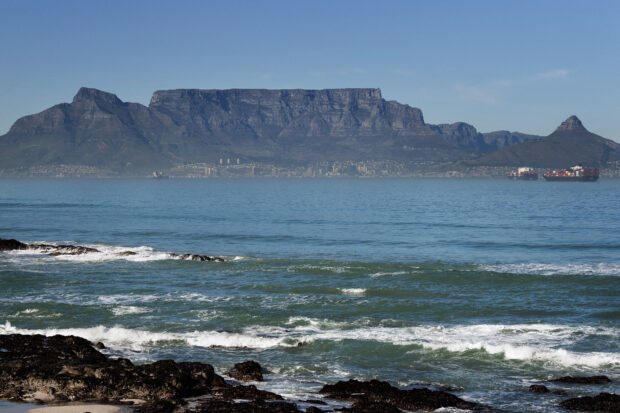Table Mountain attacks highlight crime threat to S. Africa tourism

A view of Table Mountain, across Table Bay, from Bloubergstrand Beach, in Cape Town on September 28, 2023. AFP
CAPE TOWN — Hikers hit the trail before dawn at South Africa’s natural jewel Table Mountain, but instead of simply trekking its rugged landscape they were also demonstrating against a surge in attacks on walkers and tourists.
Pensioner Mary Lloyd, among the roughly 50 gathered to sound the alarm at one of Africa’s most visited landmarks, had only weeks prior become one of the victims.
The 75-year-old was on her daily walk along the massif’s footpaths when two men pounced on her — grabbing her phone and threatening to cut off her fingers off when she couldn’t remove her rings fast enough.
“Mostly I feel absolutely angry because it has taken away my freedom on the mountain. I don’t feel safe as I walk,” said Lloyd at the protest near Cape Town.
With South Africa’s tourist season near its peak, guides worry about taking hikers onto one of Africa’s major draws at dawn and dusk because of the risk.
Article continues after this advertisementCape Town authorities say there have been more than 80 attacks on the mountain paths this year, most since August.
Article continues after this advertisement‘We want to feel safe’
Police and park rangers now carry out special patrols in the park, while drones and helicopters buzz around the 1,086 meter high plateau.
Three park rescuers were robbed after carrying out one night time operation.
Authorities say several arrests have been carried out but still recommend that walkers tackle the three-hour trek in a group and in daylight hours.
Munashe Serime, a 25-year-old trainee Cape Town lawyer, said people should always be vigilant on the mountain.
“I think people underestimate, seeing that when you (are) hiking you have your guard down,” Serime added.
Mountain guide Kathy Leverton, 39, considers the mountain paths to be her “office” but is now nervous when she enters.
“Everybody wants to feel safe going to their office,” she said.
“You definitely think twice now when people want to book tours for sunrise in particular, because it does mean waiting around in the morning in the dark.”
Andy Davies, chairman of Friends of Table Mountain, told the demonstration that it was “unacceptable to be too scared to go up our mountain. We as a public need to stand up and fight for the right to use our mountain safely.”
Wearing head lamps for light and carrying banners, the hiker demonstrators marched to the top of the mountain on the Lion’s Heat route where many hikers have fallen prey to attacks.
“For the residents of the city, it’s a place of peace and tranquility where we can escape work stress and life stress,” said Davies.
“It’s also a very, very important tourist attraction. And it’s incredibly important that we take care of the mountain and that we ensure that anybody who visits the mountain feels safe.”
‘Killing golden goose’
The Table mountain national park attracts hundreds of thousands of tourists each year, many from abroad. As the southern hemisphere summer season hits its end-of-year-peak, the travel industry is worried.
Jean-Pierre Smith, a Cape Town councillor responsible for the city’s safety and security, said up to 240,000 people in Cape Town earn a living from tourism but highlighted recent arrests.
“Whilst an attack on a tourist is not more important than an attack on a local, it comes with an additional risk to the city of this investment in our tourism,” he said.
South Africa had four million tourist arrivals in the first six months of the year. The industry makes a bigger contribution to the economy than agriculture.
But rising crime is a growing concern across the country. Police have also stepped up patrols on the main road from the capital, Pretoria, to the Sun City resort and nearby national parks after gun-wielding raiders attacked buses of foreign visitors.
In one case, the driver of a bus carrying 32 Austrians kept going until the Sun City police station after shots were fired at the vehicle, police said.
Last week, four masked gunmen stopped a smaller bus on the road and took jewels, cash, phones and bank cards from 11 people, police added.
People like Leverton, who depend on tourism, said she would not give up but is frustrated.
Leverton said bookings are down but she is determined not to be “trapped”.
“I don’t want to be a prisoner. So I will still come out and I will still do my thing and go on my hikes and take my guests,” she insisted.
“Table Mountain is one of the top three earning national parks in the country. It’s kind of killing the golden goose by not maintaining safety.”